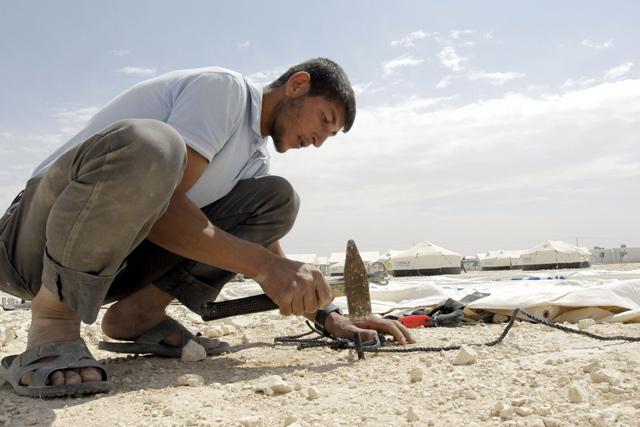You are here
‘Understanding’ reached with EU to ease origin-rules deal requirements
By Mohammad Ghazal - Nov 26,2018 - Last updated at Nov 26,2018

A Syrian refugee is seen working at a refugee camp in Jordan in this undated file photo. Syrian refugees' low interest in working in Jordan’s factories has prompted the Kingdom to request amendments to its deal with the EU to ease rules of origin for Jordanian products (JT file photo)
AMMAN — Jordan has reached an "initial understanding" with the EU to ease some requirements in the EU relaxed rules of origin for Jordanian exports to Europe, including a reduction in the percentage of Syrian manpower in the exporting industry, an official said on Sunday.
“The agreement recently reached lowers the percentage of Syrian workers that a Jordanian factory is required to hire in order to benefit from the agreement. The duration of the agreement was also extended by four more years," Yanal Barmawi, spokesperson of the Ministry of Industry, Trade and Supply told The Jordan Times over the phone on Sunday.
"The approvals we received from the EU will greatly benefit our industries and give the deal a push forward," he said.
In the original agreement, signed in 2016, if Jordanian industries were to benefit from the simplified rules of origin, each factory needed to hire Syrian employees to constitute no less than 25 per cent of its manpower by 2019, but this was lowered to 15 per cent in the new agreement, Barmawi said.
The Planning Ministry and Jordan Labour Watch have said in previous remarks to The Jordan Times that factories were struggling to fulfil the employment clause due to “difficulty finding qualified Syrian workers” and “reluctance” of Syrian employees to obtain permits in fear of losing their rights as refugees.
Under the original deal, the EU designated a total of 18 industrial and developmental zones as beneficiaries of the deal, but said that the relaxed rules would be applied to other industries across the Kingdom as soon as 200,000 jobs were created for Syrian refugees.
“Under the new understanding, when the number of Syrians working in various sectors reaches 60,000, all areas and factories in Jordan will benefit from the deal, which is a key amendment,” Barmawi added.
“Around 42,000 Syrians are already working in factories from several sectors in Jordan. We only need 18,000 more so all factories in all areas can benefit from the agreement,” he indicated
The 10-year agreement was set to end in 2026, but the new understanding reached between Jordan and the EU will see the deal extended to 2030.
“These amendments are significant and come at a time when a very limited number of Jordanian companies have benefitted,” the spokesperson added.
Since the agreement went into effect, 13 Jordanian companies have fulfilled all of the conditions to benefit from the relaxed rules of origin and only six of them exported products to European countries under the deal’s terms.
As part of the original deal signed in July 2016, manufacturers in Jordan can import up to 70 per cent of the raw materials used in production and still label the finished products as “Made in Jordan”, qualifying them for trade concessions.
Related Articles
AMMAN — Officials and experts on Thursday said an agreement reached between Jordan and the EU a day earlier to ease some requirements in the
AMMAN — Minister of Industry, Trade and Supply Tareq Hammouri said that his talks with officials at the European Commission in Brussels have
AMMAN — Jordan said on Monday that the EU did not approve Jordan's request for more facilities under the relaxed rules of origin relating to












